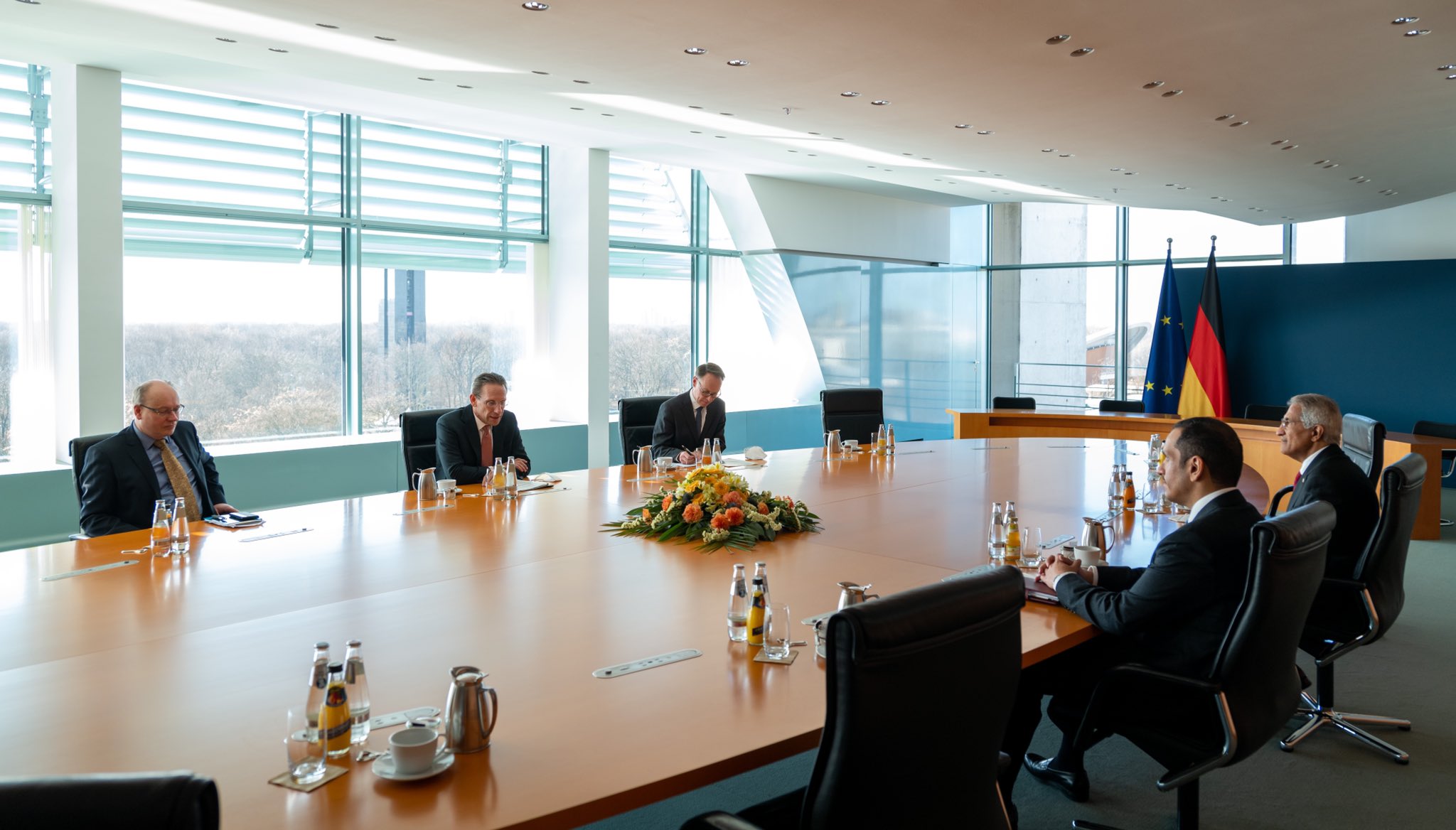EU is ending its reliance on Russian gas, intensifying its economic response to the invasion of Ukraine.
As Berlin looks to reroute its energy supply from Russian oil and gas industries, leading LNG supplier, Qatar, and Germany discuss energy supplies, according to the federal chancellery’s state secretary, Joerg Kukies.
Joerg Kukies held talks with the Deputy Prime Minister and Minister of Foreign Affairs, Sheikh Mohammed bin Abdulrahman Al-Thani, who also heads the Qatar Investment Authority sovereign wealth fund.
As European countries turn away from Russia amid its invasion of Ukraine, countries like Germany look for new liquified natural gas (LNG) suppliers, especially as Berlin is set to phase out its last nuclear power plants this year and plans to construct its first ever LNG terminal within the two years, according to Reuters.
I met with HE Deputy Prime Minister and Minister of Foreign Affairs of Katar 🇶🇦 Sheikh Mohammed bin Abdulrahman Al-Thani @MBA_AlThani_ . We discussed bilateral cooperation particularly in energy and corporate investments. pic.twitter.com/FU5HEB8e3E
— Jörg Kukies (@joergkukies) March 12, 2022
Qatar and Europe’s energy supply
Qatar has recently been approached by United States officials earlier this year regarding a possible Qatar LNG supply to Europe in the event of a Moscow invasion of Kyiv.
The Gulf country, however, reiterated that it will not be able to unilaterally replace Europe’s energy supply should there be a Russian invasion of Ukraine, noting that energy security “requires a collective effort,” as Reuters reported.
Qatar has said it could divert a possible amount of 10-15% of its LNG shipping volumes, as reported by Reuters.
The US has announced a complete ban on Russian oil, gas and coal imports, after Ukraine called for sanctions to be expanded, reports said. The move came after Russia warned it could potentially sever its gas supplies to European countries if an oil ban were to be implemented.
Although the US does not import much of Russian gas, prices in the US are still up significantly due to the “knock-on effect” of supply shortages, as per reports.
Europe receives 40% of its gas supplies from Russia as almost a third of the shipments pass through Ukraine. If Russia implements an actual embargo on gas supplies to European countries, Germany and Italy would be especially “vulnerable.”

Germany’s stance
For decades, German governments have “pursued a strict policy of not sending weapons to crisis regions,” reports noted. The country’s stance with regards to arms deliveries has changed drastically as Berlin initially refused to supply military aid to Ukraine in the ongoing crisis.
In what has been described, last month, to be a “historic parliamentary session,” the German Chancellor Olaf Scholz announced his government’s decision to provide Kyiv with weapons, to support a series of sanctions against Russia, and to enhance defence spending.
German Economy Minister Robert Habeck, in an exclusive interview with Frankfurter Allgemeine Sonntagszeitung Newspaper, said that he plans on making Germany independent of Russian coal and gas in less than a year.
“Every day, in fact every hour, we say goodbye to Russian imports to a certain extent,” Habeck told the newspaper. “If it works, we will be independent of Russian coal in the autumn and almost independent of oil from Russia by the end of the year,” he added.
Qatar and various countries discuss energy cooperation
Last week, Austria visited Doha to discuss ways to strengthen its energy cooperation with Qatar in a bid to minimise its current dependence on Russian gas, said Austria’s Federal Chancellor Karl Nehammer.
Qatar’s Minister of State for Energy Affairs, Saad Sherida Al-Kaabi met with Jennifer Granholm, US Secretary of Energy last week, where the two discussed energy cooperation between their respective countries.
Similarly, QatarEnergy’s President and CEO discussed bilateral relations with Greg Hands, the United Kingdom’s Minister for Energy, Clean Growth and Climate Change.
Follow Doha News on Twitter, Instagram, Facebook and Youtube







